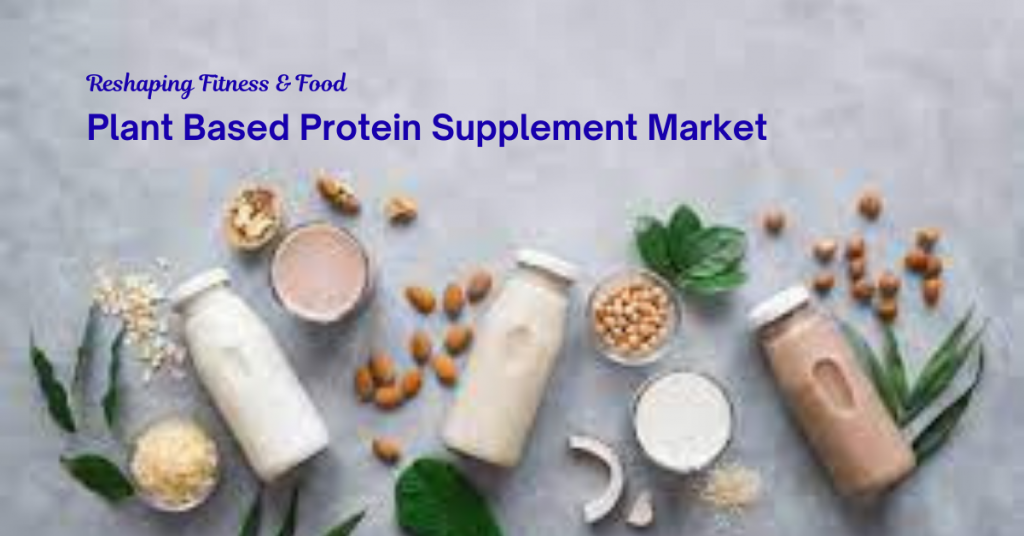
Market Overview
The Plant Based Protein Supplement Market is undergoing a rapid transformation, fueled by changing dietary preferences and a strong focus on sustainable nutrition. As of 2024, the market was valued at USD 2625 million and is expected to reach USD 5335.4 million by 2032, growing at a CAGR of 8.2% during the forecast period. This upward trajectory reflects a broad consumer shift from animal-based to plant-derived proteins, driven by concerns over health, environment, and ethics.
Plant-based protein supplements are now seen as more than just niche products for vegans or vegetarians. They are part of a mainstream movement toward clean, functional foods that support an active and conscious lifestyle. Consumers across demographics are turning to products that deliver health benefits without the environmental burden associated with animal agriculture. Moreover, the pandemic has reinforced interest in personal well-being and immunity, further elevating the role of plant-based proteins in daily diets.
The market is also evolving with innovations in formulation, packaging, and flavor development, making products more appealing to the general public. The entry of large food and beverage corporations into the space underscores the potential of this market. As plant-based diets gain momentum across regions, plant protein supplements are poised to become a central component of the global nutrition economy.
Read full report: https://www.credenceresearch.com/report/plant-based-protein-supplement-market
Market Drivers
Evolving Consumer Preferences
A major driver for the plant-based protein supplement market is the global shift in consumer behavior. People are prioritizing health, wellness, and sustainability in their food choices. The rise of flexitarian diets, where people reduce but don’t eliminate animal products, is broadening the customer base for plant protein. These changes are influenced by a growing awareness of chronic diseases linked to red meat consumption, prompting consumers to look for alternatives that align with health goals and ethical beliefs.
Expansion of Functional Nutrition Products
Functional foods, which offer benefits beyond basic nutrition, are increasingly in demand. Plant-based proteins are now being integrated into multi-functional supplements that support energy, recovery, weight management, and immunity. This evolution is helping manufacturers cater to a variety of consumer needs under one label. As more people move toward proactive health management, demand for fortified and plant-enriched products will likely surge, expanding the market’s scope.
Mainstream Retail and Brand Adoption
What once began in health food stores has now reached supermarket shelves and mass retailers. Top consumer brands and global retailers are entering the plant-based protein space, signaling strong long-term confidence. From high-protein cereals to snack bars and protein-infused beverages, the variety and availability of plant-based options have grown significantly. Increased visibility and accessibility are encouraging trial and driving repeat purchases.
Growing Sports and Recovery Segment
The sports nutrition category is experiencing a plant-based revolution. Athletes and fitness-conscious individuals are embracing supplements that support muscle recovery and endurance without dairy or synthetic ingredients. Plant-based proteins are gaining ground due to their hypoallergenic and anti-inflammatory properties. With the growing popularity of high-intensity workouts, yoga, and endurance training, clean-label plant-based protein is becoming a preferred choice for performance nutrition.
Market Challenges
Perception of Inferior Nutritional Value
Despite evidence supporting their efficacy, plant-based proteins are sometimes perceived as inferior to animal-based counterparts. Concerns around complete amino acid profiles and protein quality persist among fitness professionals and traditional consumers. Educating users on complementary plant protein combinations is necessary to change these perceptions and boost adoption rates.
Limited Agricultural Infrastructure for New Sources
While soy and pea are widely cultivated, other emerging protein sources like fava bean, lentils, and microalgae lack sufficient agricultural infrastructure. This limits scalability and restricts ingredient diversification. Inconsistencies in supply can result in price volatility and hinder product innovation. Building stable supply chains for novel sources will be key for sustained growth.
Consumer Skepticism on Ingredient Lists
Consumers are increasingly scrutinizing labels, and some plant-based protein supplements contain additives, artificial sweeteners, or stabilizers. Clean-label expectations require brands to be transparent and avoid synthetic or ultra-processed ingredients. Failure to meet these standards can erode trust, especially among health-focused buyers.
Cultural Resistance in Traditional Markets
In regions where meat and dairy are deeply embedded in the culinary culture, plant-based protein supplements face cultural resistance. These products may be viewed as less satisfying or unnatural. Overcoming cultural norms and educating consumers about the benefits of plant-based protein will require localized messaging and community engagement.
Market Opportunity
Rise of Personalized Nutrition
The trend toward personalized health and wellness is opening new doors for the plant-based protein market. Companies are offering tailored protein blends based on an individual’s fitness goals, lifestyle, allergies, or nutrient deficiencies. Technology-enabled platforms and DNA-based nutrition are helping brands deliver custom solutions, enhancing user engagement and product relevance.
Incorporation into Daily Food Formats
Plant-based protein is increasingly being infused into regular food items such as pancakes, baked goods, pasta, and coffee creamers. This integration makes it easier for consumers to meet daily protein requirements without drastically changing their eating habits. It also expands the market beyond the supplement aisle and into everyday grocery staples.
Institutional and Foodservice Adoption
Institutions like schools, hospitals, and corporate cafeterias are starting to offer plant-based protein options. Partnerships with foodservice providers and public health organizations are enabling broader exposure. These settings help normalize plant-based consumption and offer consistent usage opportunities, creating a steady demand channel.
Focus on Women’s Health and Senior Nutrition
Women and elderly consumers represent under-tapped demographics in the protein supplement space. Plant-based proteins appeal due to their digestibility, hormonal balance support, and anti-inflammatory properties. Brands are launching gender-specific and age-tailored formulations that cater to nutritional needs across life stages, unlocking new revenue segments.
Market Segmentation
By Raw Material
- Soy Protein
- Pea Protein
- Rice Protein
- Hemp Protein
- Others
By Product
- Protein Powders
- Protein Bars
- Ready-to-Drink (RTD) Beverages
- Others
By Distribution Channel
- Supermarkets/Hypermarkets
- Specialty Stores
- Online Retail
- Others
By Application
- Sports Nutrition
- Functional Food
- Dietary Supplements
- Others
By Region
- North America (U.S., Canada, Mexico)
- Europe (UK, France, Germany, Italy, Spain, Russia, Belgium, Netherlands, Austria, Sweden, Poland, Denmark, Switzerland, Rest of Europe)
- Asia Pacific (China, Japan, South Korea, India, Thailand, Indonesia, Vietnam, Malaysia, Philippines, Taiwan, Rest of Asia Pacific)
- Latin America (Brazil, Argentina, Peru, Chile, Colombia, Rest of Latin America)
- Middle East & Africa (GCC Countries, South Africa, Rest of the Middle East and Africa)
Regional Analysis
North America
North America continues to lead the global plant-based protein supplement market due to early adoption, mature fitness culture, and strong retail infrastructure. The U.S. is home to a broad range of plant-based protein brands targeting everything from muscle building to general wellness. Canada is showing significant momentum with its national food policy supporting plant-forward diets. Online platforms and influencer marketing are playing a vital role in expanding brand awareness and product usage across North America.
Europe
Europe’s demand for plant-based protein is reinforced by progressive environmental policies and conscious consumerism. Countries like the UK, Sweden, and the Netherlands are advancing fast, driven by both regulatory support and an established organic food culture. European consumers value traceability and clean labels, which encourages companies to innovate responsibly. There’s also a growing interest in fermented and sprouted plant proteins in this region, reflecting a shift toward holistic and gut-friendly nutrition.
Asia Pacific
Asia Pacific presents huge growth potential, led by dynamic economies and shifting dietary trends. Japan and South Korea are focusing on functional beverages, while India and China are capitalizing on their plant-based food traditions. Governments are supporting health campaigns that encourage protein-rich diets, offering a positive regulatory environment. Urbanization, busy lifestyles, and high lactose intolerance rates are pushing consumers toward plant-based convenience products, especially in urban centers.
Latin America and Middle East & Africa
In Latin America, consumer interest is rising in markets like Chile, Peru, and Colombia, driven by a combination of wellness trends and agricultural innovation. Brazil leads the pack with a growing domestic industry for plant proteins. Similarly, the Middle East & Africa region is gaining traction, especially in the UAE and Saudi Arabia. Influencer-driven fitness culture and increasing disposable income are major contributing factors. Cultural sensitivities and halal compliance are key focus areas for manufacturers in these regions.
Top Companies
- Abbott Laboratories
- Transparent Labs
- Glanbia plc
- AMCO Proteins
- The Bountiful Company
- MusclePharm Corporation
- Quest Nutrition
- IOVATE Health Sciences International, Inc.
- WOODBOLT DISTRIBUTION LLC
- NOW Foods
Future Outlook
- Demand for clean-label plant protein products will intensify, pushing brands to reformulate.
- Local sourcing of raw materials will reduce dependency on global supply chains.
- Collaborations with fitness tech apps will enhance user-specific nutrition planning.
- Plant-based collagen and hybrid solutions will disrupt the beauty and wellness segment.
- Advances in fermentation tech will improve taste and nutrient profiles significantly.
- Government support for sustainable farming will influence ingredient availability.
- Regional flavor profiles will help brands appeal to culturally diverse populations.
- Innovations in protein crisps and crunchy formats will diversify snacking options.
- Scientific studies validating long-term benefits will strengthen consumer trust.
- Cross-category product blending will lead to the rise of “snackaceutical” items.
Read full report: https://www.credenceresearch.com/report/plant-based-protein-supplement-market









